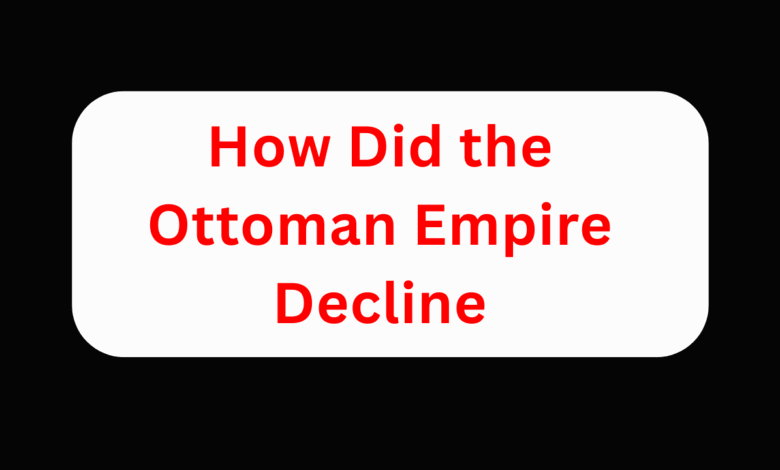How Did the Ottoman Empire Decline

The Ottoman Empire was one of the longest lasting empires in the world. It began in the late 1200s and continued until the early 1900s. At its height, it controlled large parts of Europe, Asia, and Africa. The empire was powerful, rich, and respected for many centuries. It was known for its strong army, beautiful architecture, and advanced system of government. But like all great empires, the Ottoman Empire also declined and finally came to an end.
In this article, we will explore the main reasons for the decline of the Ottoman Empire in very simple words.
Too Large to Control
One of the first reasons was size. The Ottoman Empire became very large, stretching across three continents. At first this made it powerful, but later it became difficult to control. Communication was slow, and ruling far away regions was not easy.
When trouble started in one part, the central government in Istanbul could not respond quickly. Local rulers began to act more independently. The huge size of the empire slowly became a weakness.
Weak Sultans and Poor Leadership
The early Ottoman sultans were strong, brave, and capable leaders. They expanded the empire and created respect. But later, many sultans became weak. Some cared more about luxury and palace life than ruling the empire. Others were very young or inexperienced when they took the throne.
Powerful officials and advisers often controlled these weak sultans. Without strong leadership, corruption increased, and the empire lost discipline.
Corruption and Mismanagement
Corruption became common in the empire. Government jobs were sometimes sold to the highest bidder instead of being given to capable people. Officials collected high taxes for themselves and not for the state. Soldiers sometimes did not receive proper pay and lost motivation.
This corruption weakened the government and made people lose trust in the rulers.
Military Decline
The Ottoman army was once the strongest in the world. The Janissaries, an elite group of soldiers, were highly disciplined and loyal. But over time, they became lazy and corrupt. They resisted modern training and refused to accept new weapons.
European powers like Britain, France, and Russia developed modern armies and navies, while the Ottoman military remained behind. This gap in technology and discipline led to many defeats in wars.
Economic Problems
The empire also faced serious economic problems. Trade routes changed when Europeans discovered sea routes to Asia. The Ottomans lost much of their income from trade.
Heavy taxes were placed on farmers and merchants, which created anger. The empire also borrowed money from European countries, which increased debt. With a weak economy, the empire could not support its military or government properly.
Rise of European Powers
While the Ottomans were declining, European powers were rising. Britain, France, Austria, and Russia became stronger and richer. They often attacked Ottoman territories and took away land.
The Ottomans were called the “Sick Man of Europe” in the 19th century because they were weak compared to their neighbors. Step by step, they lost important areas like Greece, Serbia, Egypt, and later parts of the Middle East.
Nationalism Among Different Groups
The Ottoman Empire was home to many different groups of people, including Turks, Arabs, Greeks, Armenians, and Slavs. At first, they all lived under Ottoman rule. But in the 1800s, nationalism grew. Different groups wanted independence and their own nations.
For example, Greece gained independence in the 1820s. Later, Serbia, Romania, and Bulgaria also broke away. These independence movements weakened the empire further.
Influence of Foreign Powers
European countries often interfered in Ottoman politics. They gave loans, forced trade agreements, and supported independence movements. The empire became dependent on Europe for money and weapons.
Instead of acting freely, the Ottomans had to follow what stronger countries demanded. This made the empire weaker year by year.
The First World War
The final blow came during World War 1. The Ottoman Empire joined the war on the side of Germany. But Germany and its allies lost the war in 1918. After this defeat, the Ottoman Empire collapsed completely.
The Allied powers divided much of its land. The modern country of Turkey was created in 1923 under Mustafa Kemal Atatürk, but the old empire was gone forever.
Achievements That Remain
Even though the empire declined, its achievements are still remembered. The Ottomans built great mosques, palaces, and public works. They developed trade and culture. They created a rich mix of traditions from Europe, Asia, and the Middle East.
The empire lasted for more than 600 years, which is itself a great achievement.
The Ottoman Empire declined for many reasons. Its huge size was difficult to control. Weak sultans and corruption weakened leadership. The army became outdated, and the economy suffered. Nationalism spread among different groups, and European powers became stronger. Finally, defeat in World War 1 ended the empire completely.
The story of the Ottoman Empire shows us that no empire, no matter how powerful, can last forever. Without strong leadership, honesty, and adaptation to change, even the greatest empire can fall. Yet the memory of the Ottomans still lives in history as one of the most important empires of the world.




